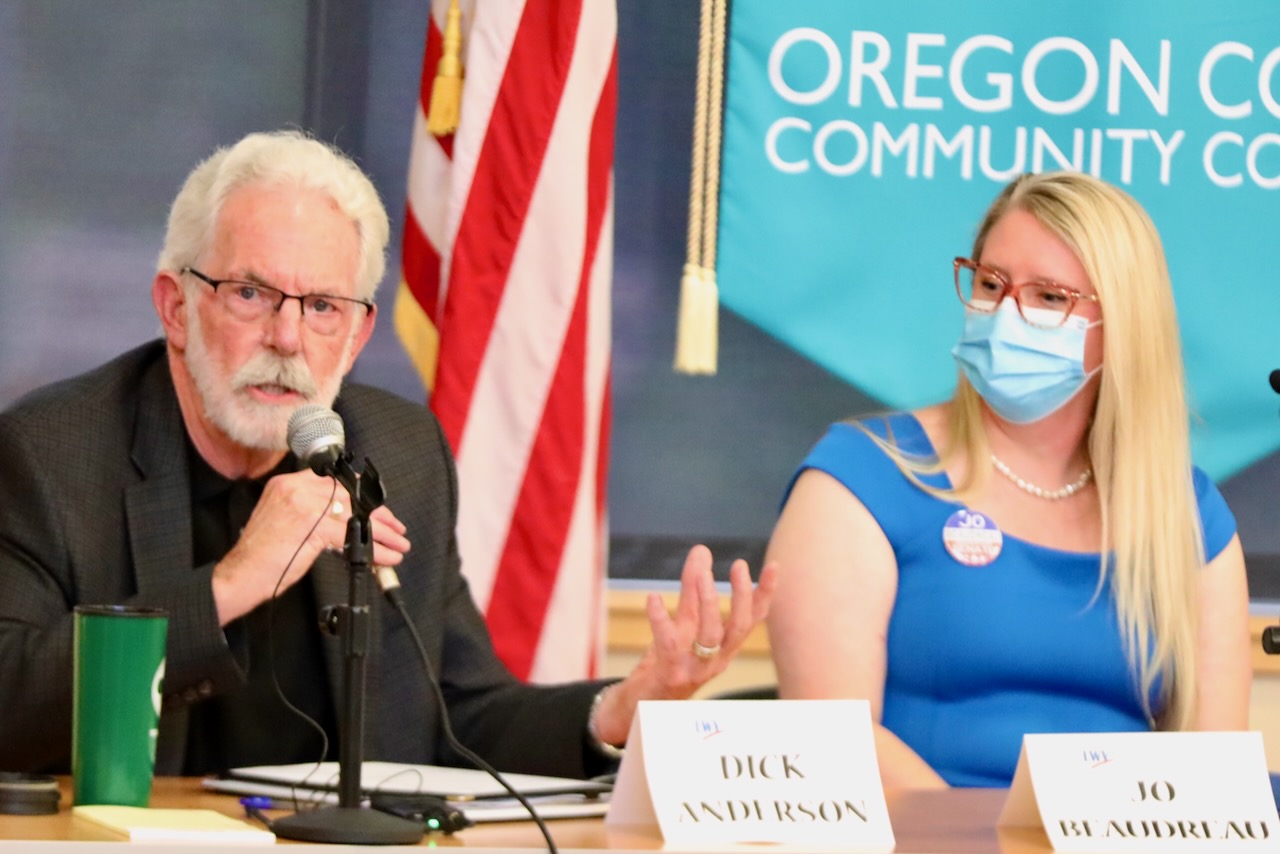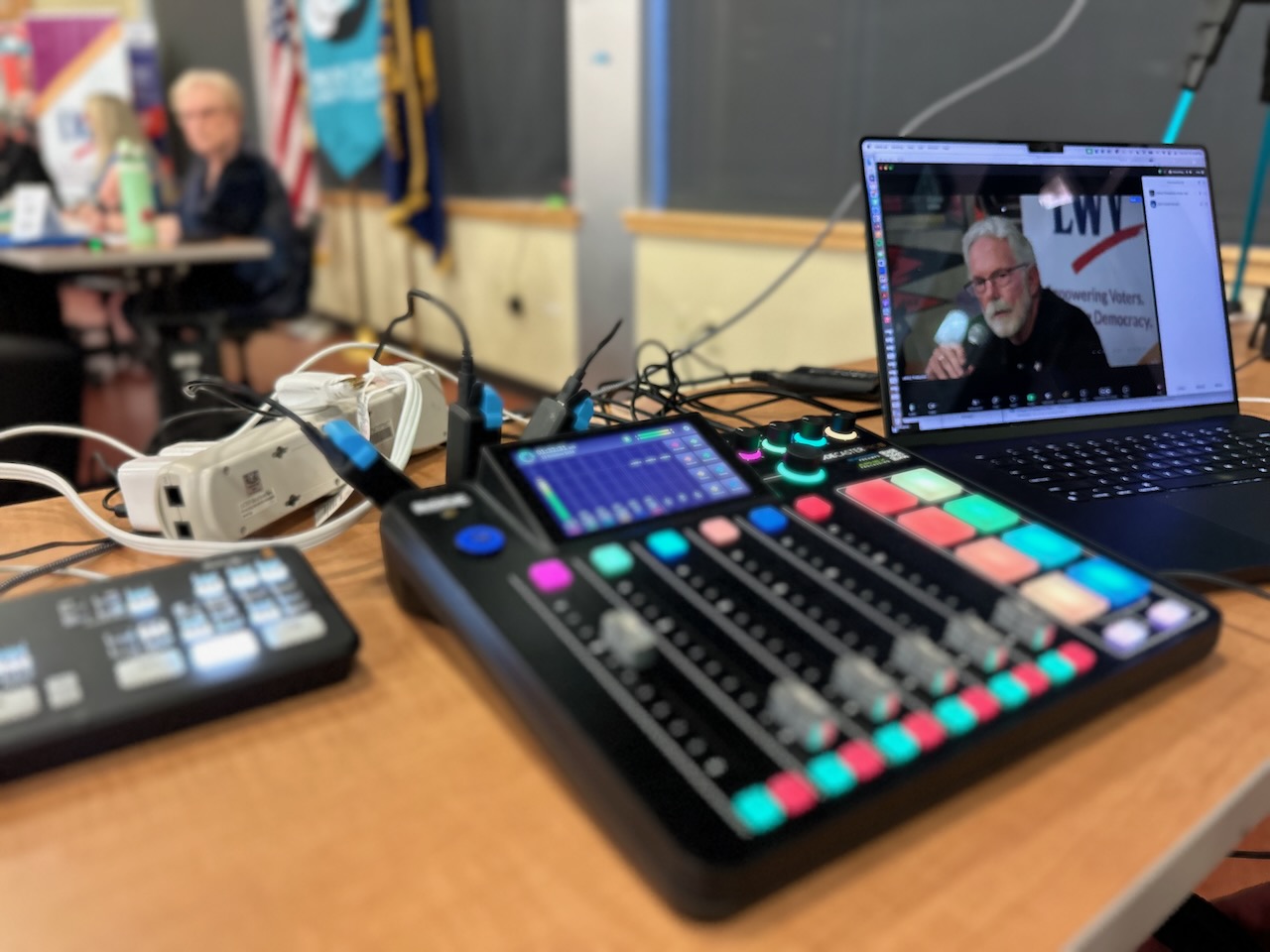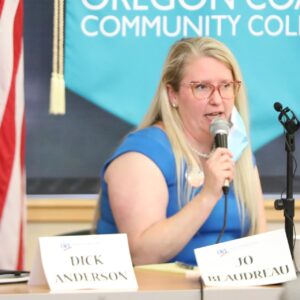
By DANA TIMS/YachatsNews
The size and shape of a district covering several coastal counties has changed since the last time voters went to the polls in 2020, but the outcome of the Oregon Senate District 5 race could still be as close as ever. Or not, depending on who is making the predictions.
 A single percentage point decided the race for the seat in both 2016 and in 2020, with Democrats winning eight years ago and now-incumbent Sen. Dick Anderson, R-Lincoln City, rebounding from a defeat that year to reclaim the seat for his party in 2020.
A single percentage point decided the race for the seat in both 2016 and in 2020, with Democrats winning eight years ago and now-incumbent Sen. Dick Anderson, R-Lincoln City, rebounding from a defeat that year to reclaim the seat for his party in 2020.
Now, with the Nov. 5 general election fast approaching, it’s Anderson trying to stave off a challenge from Florence city councilor Jo Beaudreau, a Democrat, to earn a second four-year term.
Not surprisingly, both candidates say they are confident that they’ll come out on top in a district where Democrats have a three percentage point advantage in voter registration.
“A big flood of money could still come in and let them go on a big marketing spree,” Anderson, a retired financial industry executive and former Lincoln City mayor, told YachatsNews. “We’re watching that very closely, but we’re keeping our foot on the gas to make it happen.”
Not so fast, said Beaudreau, who owns an art supply business in Florence.
“I have a fresh and enthusiastic perspective to represent this area,” she said. “A lot of fantastic people live in this district, and I believe I can be the person to best represent them.”

The dash for cash
Joint appearances by the candidates have so far been limited to a handful of candidate forums. Currently, there are just two remaining forums before election day, leaving both Anderson and Beaudreau to rely on various forms of advertising to get their messages out.
However, if campaign fundraising is any measure of the size of the media buys they’ll be able to afford down the stretch, the numbers fall heavily on Anderson’s side.
According to campaign finance filings with the Oregon Secretary of State’s office, Anderson had outraised Beaudreau by a more than four-to-one margin. That figure represents a huge difference from four years ago, when Anderson and his then-Democratic opponent, Coos Bay attorney Melissa Cribbins, both raised more than $1 million.
Much of Anderson’s financial support has come from business interests such as auto dealers, realtors and forest-products manufacturers. As of Oct. 9, he had raised a total of $484,578 in cash and in-kind contributions, with an on-hand balance of more than $203,000.
Top donors to Beaudreau’s campaign have included the Oregon Coast Electrical PAC, the Women’s Investment Network, the Senate Democratic Leadership Fund and the campaigns of other Democrats. As of the same date, she’d raised a total of just over $109,000, with a cash balance of $36,436, according to state filings.
Anderson attributed much of his fundraising success to the track record he established first as a city councilor and mayor in Lincoln City, and, since 2020, as the Senate District 5 incumbent.
“I like to lead by example,” he said. “I have been in the public arena for quite a while now and people can certainly judge me by what I have gotten accomplished.”
Beaudreau, for her part, said she is “not worried at all” by her fundraising deficit. But she also used the topic to take a bit of a shot at Anderson.
“Incumbents come pre-stacked with money,” she said. “I have actual people, and not just corporations, funding me.”
New district boundaries
Adding a wrinkle to the contest are the new boundaries drawn by redistricting requirements implemented after the 2020 Census.
The district is now narrower after the former northern boundary of Tillamook was shaved off down to just above Otis in north Lincoln County.
The other big change is that District 5 is no longer the only Senate district to wholly encompass the coast. Instead, the redrawn boundaries now extend farther inland to trace a jagged line that runs north to south from Philomath in Benton County to near Veneta in Lane County before rejoining the coast just south of Coos Bay.
In addition to requiring far more travel to meet the new district’s constituents, the new lines give Republicans a three percentage point pickup in voter registration. As now constituted, the district is 29 percent Democratic and 26 percent Republican, with the rest falling to various minor parties and unaffiliated voters.
“That’s definitely a little nicer for me,” Anderson said. “But I still have to get unaffiliated voters activated to win.”
The new boundaries aren’t a big deal for Beaudreau, she said, because this is her first run in the district. “But I’ve been so impressed and enthusiastic about the support I’m getting,” she added. “It makes my decision to run even more solid.”
On the issues
In terms of campaign agendas, Anderson said he is still focused on three particular issues he outlined in his successful bid in 2020. Those included freezing property taxes for seniors, expanding credits for childcare and instituting term limits.
“Those three still fit right in with what I’m trying to accomplish,” he said. “In fact, I think they are more important than ever.”
When it comes to childcare, Anderson pointed to a bill he helped usher through the 2023 legislative session that established three pilot programs to explore how more service providers can be added in both rural and urban areas of the state.
“What I keep learning about are all of the barriers limiting who can get into this very important business,” he said. “I’m hopeful that these pilot programs will shed a lot of light on what can be done to help those badly in needed of child-care assistance.”

Beaudreau said she is taking a multi-pronged approach when it comes to the most important issues facing District 5 residents.
“Many people are concerned about things such as availability of housing and access to health care,” she said. “But what’s clear to me is that so many of these are intertwined. Investing in transportation infrastructure, for instance, then opens up opportunities for adding new buildable land that can be accessed by those who will live on those lands.”
She is also calling for new investments in education and emergency-management solutions.
“The key to this entire district is that we have an awful lot of rural folks who all too often get left behind,” Beaudreau said. “I’ve lived in rural areas most of my life and I think I have a very good understanding of what these communities need to thrive.”
Another view
At least one person who doesn’t see the race as a toss-up is Jim Moore, a longtime political analyst and professor at Pacific University.
“Some of the first big analyses that came out in August said race ought to be leaning to Democrats,” he said. “But I’m putting it firmly in the Republican column.”
One key reason is the huge fundraising edge that Anderson currently has.
“He has a $400,000 lead,” Moore said. “That is by no means not important.”
He checked again more recently to see how fundraising has gone for both candidates and found that the $80,000 Beaudreau had raised recently was swamped by Anderson’s $250,000.
“It seems like it would have been a no-brainer to put a strong candidate in there to knock off an incumbent,” Moore said. “From everything I’m seeing, this is a missed opportunity for Democrats.”
Closing arguments
Anderson said his time in Salem has persuaded him that a more balanced Senate – say, a 15-15 split between the two parties, rather than the current Democratic edge of 17-12 (there is one independent) – would lead to better outcomes for Oregon residents.
A sizable majority of either party, he said, means those members’ own aspirations are often squelched in the name of party-line unity.
“What you don’t see are people expressing their own views through their votes,” Anderson said. “How can all 17 Democrats all agree on all of the 600 bills that finally go to the governor? More balance between the parties, I think, would help a lot.”
Beaudreau said, for her part, that her experience as a local leader in Florence has helped her understand how to energize various constituencies to get things done.
“But that experience has also taught me that a lot of things pertaining to, say, rural districts, are really decided at the state level in Salem,” she said. “That, in a nutshell, is why I am running for this office.”
Anderson lauded Beaudreau for her enthusiasm when it comes to politics, but added, “To me, it’s a little bit naïve and inexperienced, but I’m appreciative of the optimism,” he said.
The challenger bristled slightly when told of Anderson’s remarks.
“Being called naïve is an unfortunate description,” Beaudreau said. “I make no apologies for bringing a fresh and optimistic perspective about representing this district. But I also think it is good policy not to talk negatively about your opponent.”
- Dana Tims is an Oregon freelance writer who contributes regularly to YachatsNews.com. He can be reached at DanaTims24@gmail.com




Anderson needs to be held accountable for his support of the walkout by Republicans that paralyzed the legislature — and for being disingenuous about it. He made a big deal to constituents about how he stayed in his seat during the walkout, but he nevertheless supported the completely undemocratic attack on the legislative process, according to media reports at the time. He was just more clever about it than the Republicans who ultimately lost their seats because of it. He complains about a democratic majority, but that Democratic majority is what stops Republicans from doing all the crazy stuff here that they’ve done elsewhere.Vote for Beaudreau.
In a district where registered Republicans are far outnumbered by the total of registered Democrats, independents, and unaffiliated voters, a Republican state Senate candidate has an obligation to express his opinion of his party’s presidential candidate. In this case, it is a candidate who has repeatedly shown his preferences for undemocratic values, authoritarianism, and according to his former chief of staff, fascist leanings. Given the threat that Trump presents, Senator Anderson needs to make it clear to his constituents that in this election he is going to put country before party and not vote for Trump. Short of this clear statement, I can’t imagine why we of a different party, or no party, would trust his judgement.